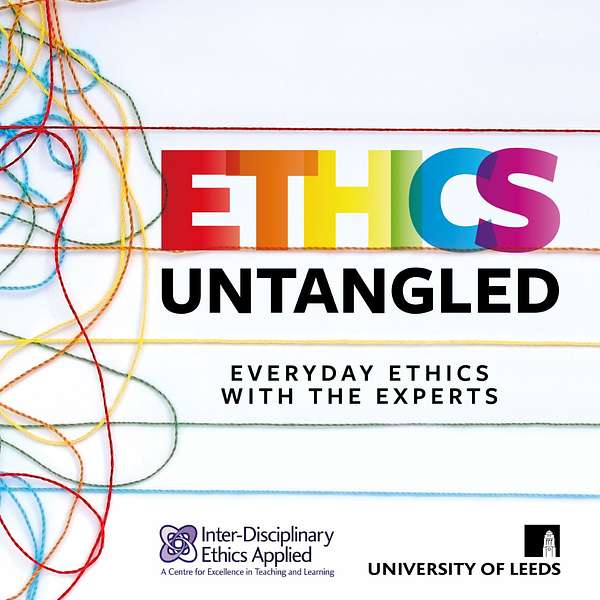
Ethics Untangled
Ethics Untangled is a series of conversations about the ethical issues that affect all of us, with academics who have spent some time thinking about them. It is brought to you by the IDEA Centre, a specialist unit for teaching, research, training and consultancy in Applied Ethics at the University of Leeds.
Find out more about IDEA, including our Masters programmes in Healthcare Ethics and Applied and Professional Ethics, our PhDs and our consultancy services, here:
ahc.leeds.ac.uk/ethics
Ethics Untangled is edited by Mark Smith at Leeds Media Services.
Music is by Kate Wood.
Ethics Untangled
24. Is your gender like your name? With Graham Bex-Priestley
Gender is, of course, one of the most contentious ethical and political topics you can find at the moment. There are numerous practical and policy debates - for example those relating to medicine, prisons and sport - which can seem completely intractable, and which provoke the strongest possible opinions on all sides.
Sitting behind these practical questions, however, is a cluster of theoretical questions, which can be summarised as questions about what gender actually is. Graham Bex-Priestley, a Lecturer at the IDEA Centre, has a novel approach to these questions. He suggests that we should think of someone's gender as being something like their name. In this interview, he explains why.
Graham's article on this topic is here:
Bex-Priestley, Graham. “Gender as Name.” Journal of Ethics and Social Philosophy 23, no. 2 (November 2022): 189–213.
And here are some articles defending the other views mentioned in the conversation:
Biological view: Byrne, Alex. “Are Women Adult Human Females?” Philosophical Studies 177, no. 12 (December 2020): 3783–803.
Family resemblance view: Heyes, Cressida. Line Drawings: Defining Women through Feminist Practice. Ithaca: Cornell University Press, 2000.
Social position via perceived reproductive role view: Haslanger, Sally. Resisting Reality: Social Construction and Social Critique. Oxford: Oxford University Press, 2012.
Social constraints and enablements view: Ásta. Categories We Live By: The Construction of Sex, Gender, Race, and Other Social Categories. New York: Oxford University Press, 2018.
Critical gender view: Dembroff, Robin. “Beyond Binary: Genderqueer as Critical Gender Kind.” Philosophers’ Imprint 20, no. 9 (April 2020): 1–31. Note the “critical gender” view is about rejecting and destabilising dominant gender ideology and is not to be confused with the “gender critical” movement, which accepts the biological view.
Existential self-identity view: Bettcher, Talia Mae. “Trans Identities and First-Person Authority.” In You’ve Changed: Sex Reassignment and Personal Identity, edited by Laurie Shrage, 98–120. Oxford: Oxford University Press, 2009.
Pluralist view: Jenkins, Katharine. Ontology and Oppression: Race, Gender, and Social Reality. New York: Oxford University Press, 2023. See also Cull, Matthew J. What Gender Should Be. London: Bloomsbury, 2024.
Performative view: Judith Butler's early books (Gender Trouble, Bodies That Matter) are the classics, but they can be difficult. In contrast, Butler's latest book is written for a public audience: Butler, Judith. Who's Afraid of Gender? Allen Lane, 2024 (many of the topics in this book are discussed in their Cambridge public lecture of the same title).
Ethics Untangled is produced by IDEA, The Ethics Centre at the University of Leeds.
Bluesky: @ethicsuntangled.bsky.social
Facebook: https://www.facebook.com/ideacetl
LinkedIn: https://www.linkedin.com/company/idea-ethics-centre/